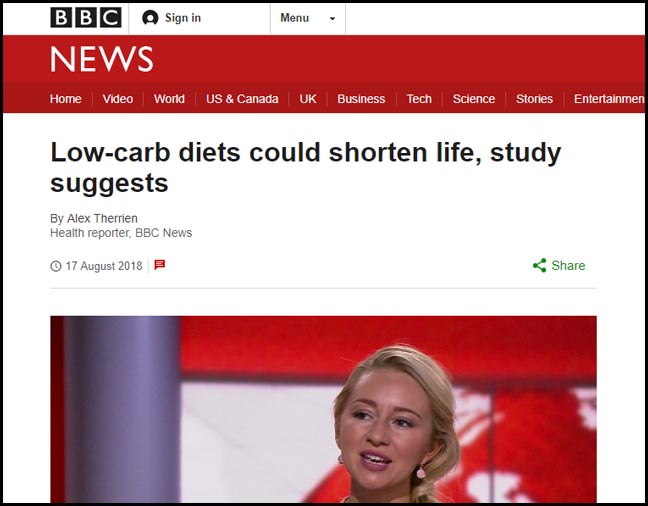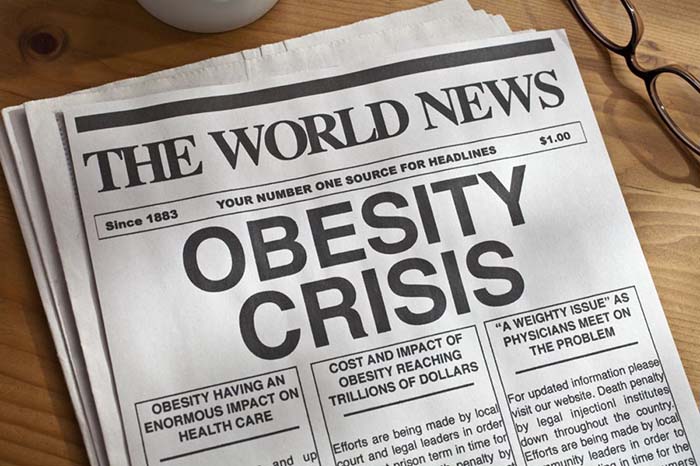People who struggle with obesity carry the label of being lazy and lacking will power, yet every overweight person I know struggles with their weight. They listen to the news reports, follow the doctor’s advice meticulously, and are anything but lazy. They fight a lifelong battle against being fat. This is an issue for bioethics because I’m getting angry at being lied to and so should you. Food producers and the diet industry have a special interest in keeping people fat, and the media is in cahoots with them. This new study shows just how far they will go to give misinformation to the general public.
The recent rise of the Keto and the Paleo diets have seen a sharp drop in the sales of processed food. Both lifestyles stress a low carb diet. People are reporting they are feeling much healthier. They are losing weight without using the diet industry. And Type 2 diabetes is being cured within 2 weeks. The gluten free fad has dropped the sale of carbs even more. So now we see a new study has come out purporting that eating carbs is not only good for you, it’s NECESSARY. You will lose years off your life if you don’t eat carbs! Or so the claims go.
Yet a quick read shows the study has serious flaws, and perhaps reached a false conclusion to pay off corporate sponsors. People could die from this misinformation. Yet the media have picked up the cry and run full tilt with it. Yes, the study is legitimate in so far as it was published in the August issue of the Lancet. The Lancet is kind of the Harvard standard for medical journals. It’s where your doctors get their information from. It’s where the professors who train medical students get their information from. So the study has to be true. Right? Wrong. The medical and bioethics communities are wondering how such a poorly run study made it passed the peer review board.
THREE CRITICAL PROBLEMS WITH THE METHODOLOGY
Three critical problems exist with the methodology used to reach their conclusion. The first is that their conclusion is based on a conglomeration of studies done over a 25 year period of time. So while they report a huge sample size over a global perspective, this is a mishmash of independent studies. A scientific study has to have controls. You need a controlled environment to rule out other factors that might influence your research. This is why studies are costly and rare. You need to be precise to be accurate. In this study, it was more like going to a yard sale and sorting through the piles. The researchers picked and chose their data, selecting some and ignoring others. They found data that supported their theory. Yard sale shopping is not considered a valid scientific methodology.
The second problem is with the study they actually did. The researchers interviewed a smaller sample of people aged 45-60 three times over a 6 year period. The whole study with its “eat carbs or die” message revolves around a food questionnaire the participants filled out, based on what they think they ate during the year before. I can barely remember what I ate yesterday, and have no idea of what I ate last week. I have absolutely no clue what I ate last year. So 15,000 middle aged to older people were asked to guess what they ate and how much of it.
At the very most, this would give results that could offer broad categories – people who were vegetarians would stand out as not eating animal protein and getting their fats from non-dairy related sources. Some people liked to eat fried food. Some people ate fast food on a regular basis. And others ate mostly yogurt and salads with skinless chicken for dinner. A food questionnaire guessed at over a year-long period of time would give you very broad categories indeed.
No other controlled factors were in the study. Some of the participants smoked, drank heavily, slept poorly, didn’t exercise, exercised excessively, ran marathons. Some people had high stress jobs, other were relaxing in retirement. In other words, a whole gamut of factors outside the supposedly controlled study of carbs affect on life span. While the study concluded that the group who ate less carbs died 4 years sooner on average than those who ate moderate carbs, the study also reports that that group consisted of people who smoked heavily, were primarily sedentary, and had diabetes. As Ally Houston put it, perhaps it was the smoking and diabetes that caused an early death and not the carbs? Just asking. And so should they.
The final fatal flaw that should dismiss this “eat carbs or die” message is that it did not in any way test a low carb diet. Anyone following a Keto or Paleo diet knows that “low carb” means 20g of carbs or less to get the body into a state of Ketosis. Over 20g and insulin starts kicking in again. This study’s definition of “low carb” was less than 40% (<40%) of the total diet. That’s still a high carb diet. There was no complex dance of chemicals that make a low carb lifestyle so effective. The researchers never studied the health effects of a low carb diet. The results and conclusions are completely invalid.
SO WHY THE HEADLINES?
So why are the headlines screaming we need to eat carbs or die young? Because the milk and walnut industries paid for the study. One of the biggest food groups of carbs that people eat on a daily basis is cereal. When low carb people stop eating cereal, they stop using milk on the cereal they are no longer eating. Sales of milk and cereal hit a record low when millennials go Paleo or Keto. And just to make sure you get paranoid and eat lots of carbs, a second study has also just come out saying eating cereal will improve your diabetes, sponsored by guess who? The Milk Advisory Board. Surprise, surprise. This study is a paid propaganda piece for the milk industry. Doctors who treat diabetes are furious, and you should be too.

